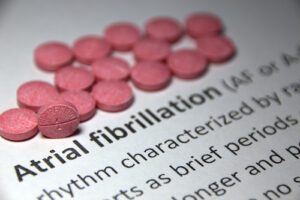Atrial fibrillation (also referred to as AFib or AF) is a heart condition that causes irregular or quivering heartbeat, known as arrhythmia. The cause of AFib isn’t fully understood and can affect anyone, regardless of age. However, it’s more common with older people (65 and older) and often affects those with conditions like hypertension and atherosclerosis. It’s also more common in men than women and may be triggered by excessive smoking and drinking.

Normally, the heart rate should be regular, between 60 and 100 beats per minute at rest. You can measure it yourself by simply feeling your neck or wrist pulse. During Afib, the heart rate is irregular and can be very fast, sometimes going significantly higher than 100 beats per minute.
Because of this, the patient may experience dizziness, tiredness, and shortness of breath. You may also notice heart palpitations––you feel like your heart is pounding or beating irregularly. This lasts a few seconds and sometimes a few minutes.
While symptoms are noticeable in many cases, sometimes AFib doesn’t cause symptoms. The patient can be completely oblivious of their irregular heart rate.
When Should You Report Atrial Fibrillation?
Make an appointment with your doctor immediately if you notice:
- A sudden change in your heartbeat.
- Your heart rate is consistently higher than 100 or lower than 60 beats a minute, especially if this is accompanied by other symptoms of AFib.
- Chest pain.
How is AFib Diagnosed?
AFib is commonly diagnosed based on:
- Medical and family histories.
- A physical exam.
- Results from other tests and procedures.
If it hasn’t caused symptoms, it may be revealed with an electrocardiogram (EKG) or other tests.
It’s best to speak with a doctor, as they will help you discover exactly what’s causing your AFib. This will help them plan the best treatment procedure.
They will ask questions like:
- What signs and symptoms are you experiencing?
- Do you have other health conditions? (Significant conditions include a history of heart disease, hypertension, thyroid problems, lung disease, and diabetes).
- Does anyone else in your family have AFid?
- Do you smoke or drink alcohol or caffeine?
 Physical Exam
Physical Exam
Your doctor will do a cardiac exam. They will listen to your heart rate and rhythm and read your pulse and blood pressure.
They might also check your heart for muscle or valve problems, as well as heart failure.
To confirm or dismiss hyperthyroidism, they will check for swelling in your legs or feet.
Tests and Procedures
If you come to LabFinder, we will conduct additional tests and procedures to fully determine the cause of your AFib. These include:
EKG
This is the most useful test for diagnosing AFib. Gladly, it’s simple and painless. It’s used to test and record the electrical activity in the heart.
An EKG records the speed and rhythm of your heart as well as the strength and timing of electrical signals passing through your heart.
A standard EKG is used to test for AFib for around 20 seconds and will not record any AFib that doesn’t happen in that duration. To test for longer periods, you may be asked to wear a portable EKG monitor such as the Holter and Event monitors.
Stress Test
A stress test gets your heart to work harder by exercising or taking medication to increase the heart rate. This test is necessary as there are certain heart conditions that become more readily diagnosed when the heart is under stress.
Other tests and procedures that you come across include:


 Physical Exam
Physical Exam

